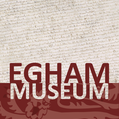Prince Rupert in Runnymede
 Charlotte Young, PhD candidate at Royal Holloway, University of London, investigates Egham during the Early Modern period and in this article, goes back to 1642 when Prince Rupert came to Runnymede.
Charlotte Young, PhD candidate at Royal Holloway, University of London, investigates Egham during the Early Modern period and in this article, goes back to 1642 when Prince Rupert came to Runnymede.
The Civil Wars between King Charles I and the Parliament were arguably the most turbulent in British history. One of the generally accepted causes of the conflict was Charles’ period of personal rule, which had lasted from his dissolution of Parliament in 1629 until 1640. This 11 year period saw his introduction and enforcement of hugely unpopular policies, such as the ship money tax, the Laudian reforms of the Church of England, and the imposition of a new Prayer Book in Scotland; the latter led to a Scottish invasion of England. In 1640 Charles was forced to summon Parliament again to seek financial assistance to repel the Scottish forces. To his annoyance his MPs were unwilling to agree to his demands after so many years of exclusion from power, and instead presented him with a list of their grievances in December 1641, in a document known as the Grand Remonstrance.
Charles left London in January 1642, after his ill-fated attempt to arrest 5 members of the House of Commons on a charge of treason. He entered the Commons on 4th January accompanied by armed soldiers, but the MPs in question had been warned and had escaped by boat. The Speaker of the Commons, William Lenthall, refused to tell the King where they had gone, stating that he had ‘neither eyes to see nor tongue to speak in this place but as the House is pleased to direct me.’ Charles left the city within a week, and both King and Parliament realised that the country was on the brink of war.
After negotiations between the two sides in the spring and summer failed to provide a resolution, Charles brought matters to a head by raising his standard at Nottingham on 22nd August. This action signalled the start of civil war, because it was a call for his supporters to join his army and defend him from Parliament.
One person who answered the summons was Prince Rupert of the Rhine, whose mother Elizabeth Stuart was Charles I’s sister. The early 1640s were a turbulent time for Prince Rupert. He began his military career during the Eighty Years’ War between the Low Countries and the Spanish Empire, a conflict which had begun in 1566 and would continue until 1648. He saw active service at the siege of Breda in 1637, but was unfortunately captured in October 1639 and imprisoned at Linz Castle in Austria, aged just 20. His conversion to Roman Catholicism and the diplomatic intervention of Charles I eventually managed to secure his release in October 1641. However, his time had not been wasted because he had devoted himself to studying the theory of war.
The conflict between King and Parliament attracted Rupert’s attention, and he eagerly travelled to England to assist his uncle. He arrived in the summer of 1642, and Charles made him the commander of the cavalry. Rupert successfully led his troops during a cavalry attack at the Battle of Edgehill, the first major battle of the Civil War, on Sunday 23rd October 1642, although there was no clear victor.
Charles’ abandonment of London was a considerable tactical error, because it left Parliament in full control of the capital, with all its financial and geographical advantages. Ian Roy has stated that ‘Rupert may well have advocated a rapid march on the capital’ immediately after Edgehill in order to regain control, but that he was ‘overruled by wiser – or more cautious – politicians in council.’
In November 1642 the following report was published in two newsbooks. Although it says Prince Robert, it is referring to Prince Rupert:
‘Prince Robert draws his Forces towards Stanes, and Egham, and possesseth himself of the places about Running meade, as if he intended to pitch there a second Battle for regaining our Liberties, which was formerly won there by the Subjects of this Kingdome, and King John who had violated his oath by breaking the Laws, was here by an Army enforced to seal Magna Charta, the great Charter of our Liberties.’
It first appeared in the 13th edition of Humphrey Blunden’s Some Speciall and Considerable passages from London, published the first week of November. It then appeared again the following week in the 22nd edition of the Perfect Diurnall of the Passages in Parliament, which had been created by Walter Cooke and Robert Wood.
It seems highly likely that the report refers to his march towards London in late October. If Rupert had not been prevented from marching on London, and actually managed to regain the city, the entire course of the war would have been different. However, the ‘threat to London’, as Blair Worden called it, was ended after the Battle of Turnham Green on 13th November, when the Parliamentarian army outnumbered the King’s by almost 2:1. The conflict itself was minor, and Charles withdrew his forces before many lives were lost. Brentford and Turnham Green would have been easily accessible from Egham, which makes Rupert’s choice of securing Runnymede sensible.
The references to Magna Carta in the newsbooks were perhaps inevitable, but they also display a certain antagonism towards the King. Was the emphasis that King John had ‘violated his oath by breaking the Laws’ and been forced to sign a treaty protecting the rights and liberties of his subjects a subtle condemnation of Charles’ arbitrary rule and unpopular policies from 1629-40?
No second Magna Carta was signed on Runnymede in 1642, and the Civil Wars between King and Parliament continued until late 1648, when the King was arrested. He was placed on trial in Westminster Hall on 20th January 1649, found guilty of being a ‘tyrant, traitor, murderer, and public enemy to the good people of the nation’, and beheaded on 30th January.
Bibliography
- Charles Carlton, Going to the Wars: The Experience of the English Civil Wars, 1638-1651 (London: BCA, 1992)
- Ariel Hessayon, ‘Blunden, Humphrey (b. 1609, d. in or after 1654)’, Oxford Dictionary of National Biography, Oxford University Press, 2004; online edn, May 2015 [http://www.oxforddnb.com/view/article/59849]
- Conrad Russell, The Crisis of Parliaments: English History 1509-1660 (Oxford: Oxford University Press, 1971)
- Ian Roy, ‘Rupert, prince and count palatine of the Rhine and duke of Cumberland (1619–1682)’, Oxford Dictionary of National Biography, Oxford University Press, 2004; online edn, May 2011 [http://www.oxforddnb.com/view/article/24281]
- Some Speciall and Considerable Passages from London (London, England), November 1, 1642 – November 8, 1642; Issue 13.
- Perfect Diurnall of the Passages in Parliament (1642 : Cooke and Wood) (London, England), November 7, 1642 – November 14, 1642; Issue 22.
- Blair Worden, The English Civil Wars (Great Britain: Weidenfeld & Nicolson, 2009)

